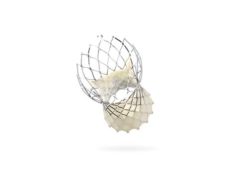
St Jude Medical has announced the first patient implants in the US IDE PORTICO trial. The trial is evaluating the Portico transcatheter aortic valve system, the first aortic heart valve that is repositionable until fully deployed. The trial will enrol patients who are considered to have a high or an extreme surgical risk (meaning they would not be considered) for open-heart surgery.
The PORTICO trial is evaluating the Portico valve and delivery system in patients with symptomatic severe aortic stenosis. During transcatheter aortic valve implantation (TAVI) procedures, a Portico heart valve is delivered via a catheter using either a transfemoral (through the artery in the leg) or an alternative access approach in order to gain access to the heart. The Portico valve is positioned in the patient’s heart as it continues to beat, alleviating the need for cardiopulmonary bypass, where a machine takes over a patient’s heart and lung function. Patients are evaluated by a heart team consisting of a cardiac surgeon and an interventional cardiologist.
The first implants in the PORTICO trial were conducted the same day on opposite coasts of the USA. One operating team comprised of Raj Makkar, director of Interventional Cardiology, and Wen Cheng, cardiothoracic surgeon and programme director of the Thoracic Surgery Residency Programme performed a Portico TAVI procedure at Cedars-Sinai Heart Institute in Los Angeles. The other operating team was comprised of Gregory P Fontana, cardiac surgeon and chairman of the department of cardiothoracic surgery and Carlos Ruiz, an interventional cardiologist at Lenox Hill Hospital in New York City. Fontana and Makkar serve as co-principal investigators for the PORTICO trial.
“As we continue to collect clinical evidence on the best way to treat patients identified as high or at extreme risk for the open-heart valve replacement procedure, the Portico valve represents a life-saving treatment option. The valve and delivery system were designed to more safely treat heart failure symptoms in patients with stenotic valves,” says Fontana.
“The ability to fully resheath and precisely reposition the Portico valve at the implant site prior to valve deployment helps achieve accurate placement, which may simplify the implant procedure and help minimise procedural risk for the patient,” says Makkar.
Built on the successful Trifecta valve platform, the Portico valve is the first transcatheter aortic valve that can be completely resheathed, repositioned at the implant site, or retrieved before being released from the delivery system.
Designed in collaboration with physicians, the self-expanding Portico valve is designed to maintain haemodynamics similar to that of a natural valve, while also addressing issues from early generations of transcatheter valves, such as paravalvular leak and the need for a permanent pacemaker as a result of the implant.
Patients at up to 40 US sites will be randomised based on the appropriate access method, including transfemoral, transapical, direct aortic, or subclavian. All trial participants will undergo a TAVI procedure receiving either a Portico valve or another commercially available TAVI valve in the USA. Data that are collected will be used to support approval of the Portico transcatheter aortic valve replacement system by the US Food and Drug Administration (FDA).
In addition to randomisation, the PORTICO trial will also collect information in the form of a registry on patients with a degenerated aortic surgical bioprosthetic valve (creating a valve-in-valve registry). These are patients in the trial who previously had valve replacement surgery and now are having a Portico valve placed inside an existing artificial valve without removing it.
The 23mm Portico transcatheter aortic heart valve and transfemoral delivery system received CE mark approval in 2012 and the 25mm Portico valve received the CE mark in 2013. CE mark clinical trials are currently underway for additional valve sizes and delivery approaches. The Portico transcatheter aortic heart valve system is limited to investigational use in the US and the PORTICO trial is being conducted under an Investigational Device Exemption (IDE) from the FDA.













